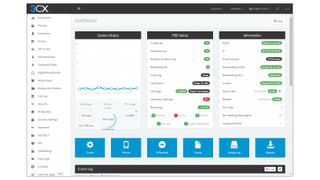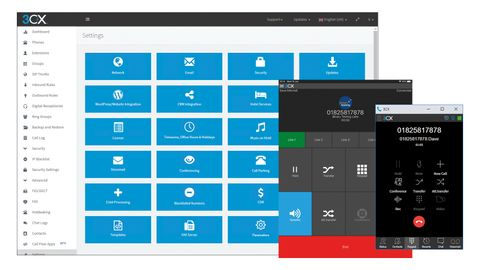Moving to an on-premises IP PBX might not be everyone’s idea of fun, but 3CX’s Phone System makes it as painless as possible. The installation procedure is kept simple, the feature set will satisfy everything on your wish list, and flexible licensing plans allow you to choose a version that’s suitable for your needs and budget.
The software is versatile too. It supports both Windows and Linux, and will run on a standard PC or server, or in a virtual machine under VMware, Hyper-V or KVM. You can even cloud-host it on Google Cloud, Microsoft Azure, Amazon AWS/Lightsail or OVH.
For our host we chose a low-cost HPE ProLiant ML110 Gen10 tower server running Windows Server 2019. Deployment was handled by a smart wizard, which guided us through the steps required to get our IP PBX ready for action, including creating an external domain name and setting up an SSL certificate – which 3CX will helpfully host for you – to allow remote users to connect securely.
Perhaps the trickiest part of setup is opening up the SIP and RTP port ranges on your firewall. This is one thing the wizard can’t do for you, but 3CX provides a great online tutorial, and the System’s web console includes a firewall tester to confirm that all required ports are reachable.
The other thing you’ll need to organise yourself is a SIP trunk. 3CX is compatible with a huge number of providers around the world, and you can configure up to five different services to ensure you’re never left in the lurch. For our tests, we used GoTrunk, which came with clear, step-by-step setup instructions for 3CX Phone System. These helped us get the service working in no time – although we subsequently had to live with a slightly annoying red icon appearing permanently on the dashboard, informing us that our chosen provider isn’t officially approved by 3CX.

The phone numbers assigned by your SIP trunk provider can be directed to extensions using inbound rules and, if you have a Pro licence, you can also set up call queues, reports and recording services, along with Office 365 and CRM integration. When you create a new extension, the appropriate person is automatically sent an email with their new phone details, along with a voicemail number and PIN. A link and login details for the web client are also provided, and there’s a call-manager extension for Chrome, which can be left running in the background even if the browser itself isn’t open.
Handset provisioning is deftly handled too. As soon as our Yealink phones were connected to the network, they appeared in the web console, ready to be assigned to users, and the 3CX software thoughtfully updated their firmware for us.
On top of all this, there’s an impressive set of advanced call-handling features. The digital receptionist option presents callers with custom messages and a menu of up to ten options, while call queues and ring groups ensure calls are always answered, users on the road can have calls redirected to their mobile or another extension and web-conferencing services come as standard.
Pricing depends on whether you want a basic licence or all the Pro features, and on how many channels you want supported: a 16SC Pro licence supports up to 16 simultaneous calls, so it should be good for around 50 users. It costs £554 per year, but if you don’t renew the maintenance contract when it expires, it drops down to an 8SC version, which is free forever, including all updates.
With easy deployment, plenty of call features and pricing to suit organisations of all sizes, 3CX Phone System is very hard to fault: we’d happily recommend it to any small business looking for an onsite IP PBX.
Dave is an IT consultant and freelance journalist specialising in hands-on reviews of computer networking products covering all market sectors from small businesses to enterprises. Founder of Binary Testing Ltd – the UK’s premier independent network testing laboratory - Dave has over 45 years of experience in the IT industry.
Dave has produced many thousands of in-depth business networking product reviews from his lab which have been reproduced globally. Writing for ITPro and its sister title, PC Pro, he covers all areas of business IT infrastructure, including servers, storage, network security, data protection, cloud, infrastructure and services.



